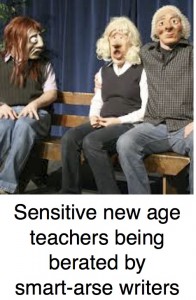Today, in Part 3, Keith Johnstone elucidates on being an artist.
Most children can operate in a creative way until they’re about eleven or twelve, when suddenly they lose their spontaneity, and produce imitations of ‘adult art’. When other races come into contact with our culture something similar happens. The great Nigerian sculptor Bamboya was set up as principal of an art school by some philanthropic American in the 1920’s. Not only did he fail to hand on his talents, but his own inspiration failed him. He and his students could still carve coffee tables for the whites, but they weren’t inspired any more. (Look here for examples of Nigerian sculptures – sorry, no coffee tables)
So-called ‘primitive painters’ in our own culture sometimes go to art school to improve themselves – and lose their talent. a critic told me of a film school where each new student made a short film unaided. These, he said, were always interesting, although technically crude. At the end of the course they made a longer, technically more proficient film, which hardly anyone wanted to see. He seemed outraged when I suggested they should close the school (he lectured there); yet until recently our directors didn’t get any training. Someone asked Kubrick if it was usual for a director to spend so much care on lighting each shot and he said, ‘I don’t know. I’ve never seen anyone else light a film.’
You have to be a very stubborn person to remain an artist in this culture. It’s easy to play the role of ‘artist’, but actually to create something means going against one’s education. I read an interview once in which Grandma Moses was complaining that people kept urging her to improve her snow scenes by putting blue in them, but she insisted that the snow she saw was white, so she wouldn’t do it. This little old lady could paint because she defied the ‘experts’. Even after his works had been exhibited in court as proof that he wasn’t in his right mind, Henri Rousseau still had the stubbornness to go on painting!
We see the artist as a wild and aberrant figure. Maybe our artists are the people who have been constitutionally unable to conform to the demands of the teachers. Pavlov found that there were some dogs that he couldn’t ‘brainwash’ unitl he’d castrated them, and starved them for three weeks.  If teachers could do that to us, then maybe they’d achieve Plato’s dream of a republic in which there are no artists left at all.
If teachers could do that to us, then maybe they’d achieve Plato’s dream of a republic in which there are no artists left at all.
Many teachers think of children as immature adults. It might lead to better and more ‘respectful’ teaching, if we thought of adults as atrophied children. Many ‘well adjusted’ adults are bitter, uncreative, frightened, unimaginative, and rather hostile people. Instead of assuming they were born that way, or that that’s what being an adult entails, we might consider them as people damaged by their education and upbringing.
